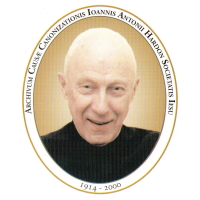Fr. John A. Hardon, S.J.
Our reflections are on the name of Jesus; its power in our lives.
Whoever enters on the path of sanctity must keep his focus clear. What are we doing? Whom are we following? How are we to act? Why are we acting as we are? All of these questions can be answered in one word: Jesus. What are we doing? Better, what should we be doing? What Jesus told us to. Whom are we following? Jesus. How are we to live? As Jesus did. And why? Why should we do all the multitudinous things that anyone who is serious about sanctity must do? Why? Because Jesus wants us to.
In order to make our reflections as definite and practical as possible, let us simply look at the following aspects of our subject. Thirty years of teaching have taught me, if you want to concentrate a lot of matter into a short space, always give your students, or here, your listeners, a preview. Then fill out the frame. What’s the preview? This is no mere subject. This is an ocean. First, to ask the meaning of the name Jesus. Second, its promise. Third, its power. And fourth, its place in our lives. Meaning, promise, power and place in our lives. There is no single word, no single title, no single name in all of God’s revelation that has been more explicitly, unqualifyingly, and solemnly explained than this one.
Meaning of the Name of Jesus
At the Annunciation, when the angel told Mary she was to become the mother of the Son of the Most High, she was told, “You are to conceive and bear a son and you must,” yet the imperative verb, “you must name him Jesus.” Then when Joseph was in a quandary whilst he discovered that Mary was with child he knew it wasn’t his child, again, the angel appeared to him, told him, “Joseph, son of David, do not be afraid to take Mary home as your wife, because she has conceived what is in her by the Holy Spirit. She will give birth to a son and you must,” again the imperative, “you must name Him Jesus because He is the one Who is to save His people from their sins.”
And the evangelist goes on recalling the prophesy of Isaiah. Two names are synonyms – Jesus and Emmanuel. Why is Jesus the one Who will save His people from their sins? Because He is God with us. God became man. That’s the reason for the Incarnation. The invisible God became a visible man. Talk about being with us. He could be seen, heard, touched, felt. And His touching us and our being touched by Him is the means, the channel, by which the Almighty become a man, saves us from our sins. Then, in one crisp verse when the eighth day came and the child was to be circumcised, they gave Him the name, Jesus; the name the angel had given Him before His conception.
So far the meaning with one more word added. What does the name mean? It means Saviour. The one Who saves sinners estranged from God. Save sinners, that’s not some generic name for humanity. That’s us. Saves us by reconciling us with a God we’ve offended. Without Jesus, there is no reconciliation. With a just God, He saves us by removing the penalty we’ve deserved for our sins. Sin means two things: loss of God’s friendship and pain, suffering as a penalty for having sinned. This being saved locks up everything that we believe we need, because we have sinned.
The Promise of the Name of Jesus
It would almost seem as though the Savior went out of His way to make as clear as possible how much we could achieve, much, pardon the grammar, how everything we could achieve, provided we have faith in His name. Memorize the place. (John 14:13). “Whatever you ask for in my name, I will do” – period. “Whatever.” “Whatever you ask for.” That’s not all. “in my name.” Behind the use of His name, must be contained a lifetime of insight and grasping and of penetration into all that is contained in that simple, holy name.
This time in Matthew, “I tell you most solemnly, anything you ask for from the Father, He will grant in my name.” (Matthew 16:23). Then, speaking to these same disciples, “Until now you have not asked for anything in my name, ask and you will receive and so thus consequently, your joy will be complete.” One sentence we are sure on Christ’s words is infallibly true, Jesus is our joy. While this is not automatic, this does not “happen to us” in spite of what we can do. We must ask. We must invoke. We must beg in this name. Summarily, what is Christ telling us as He promises not much or so much, but everything. Christ repeated and spelled out and in the most emphatic terms prescribed “this is an order, ask, but in my name” and it’s in that prepositional phrase “in my name” that we have got to know what we are saying, whom we are invoking, what infinity we are tapping. We had better know what we are doing when we pronounce and invoke this name.
The Power of the Name of Jesus
Common sense tells us that if Christ had made what humanly speaking sound like extravagant promises, that the apostolic apostolic church after Christ rose from the dead and ascended to His Father, the apostolic church would, you’ll find out, whether the promises made by Christ were real or not. They were real.
I like to dramatize this a little bit when I talk about it. He’s Peter and John shortly after Pentecost. Going toward the gate called Beautiful, there is a paralytic, helpless, asking for a handout. Peter asked what the paralyzed man wanted. He wanted some shekels. Peter and John, following the poor Christ, didn’t have shekels. So, Peter probably looked at John. “What do I do?” John shook his head. “Do it.” Peter, for a split second must have thought to himself, “Lord, I hope it works, you said it would.” So Peter with all his Petrine authority looked down at the man and told him, “Silver and gold we do not have, but what I have I give you.” The heavens waited breathlessly. “In the name of Jesus Christ, the Nazarene, walk!”, history records, otherwise I wouldn’t be speaking and you wouldn’t be listening. The man got up and walked. The first miracle of the apostolic church and appropriately performed by the first vicar of Christ. What Christ promised works. The man walked. No wonder then Peter could tell the Sanhedrin, remember, when he was taken into custody for preaching this name. This is the Peter who cowered at amazed question, “Aren’t you one of this man’s followers?” Big, brave Peter wilted, denied his master. But now stands up and tells the Sanhedrin, mind you it is the same Sanhedrin that condemned Christ to death. He should have been scared. Oh, no. Now he had power. Power to work two kind of miracles. Miracles over nature and miracles over his own weak human will. And he told the leaders of the Sanhedrin, “this is the stone rejected by you, the builders, which has proved to be the keystone for all the names given to man, this is the only one by which we can be saved and this time hear it. The Sanhedrin wilted. Talk about power. Power over the worst enemy we have – ourselves.
We read the Letters of St. Paul and the second part of the Acts of the Apostles, which are many of the acts of the apostles. Peter, Part I. Paul, Part II. Paul preached Jesus. He talked Jesus. He lived Jesus. And his greatest desire, he said, “was to be dissolved and be united with Jesus.”
If there is one main theme of the apostolic church it is the power of this name, power to work physical miracles, power especially to work moral miracles. No wonder, no wonder the Mediterranean world, the unbelieving pagan, cruel world was converted. The ones who proclaimed Christianity knew what they had at their disposal. The power of infinity become man. All crowded in one name: Jesus.
The Name of Jesus and Its Place in Our Lives
The name of Jesus is at once a creed, it summarizes everything we believe. It is a mystery beyond human comprehension in which we believe. It is a prayer. The most important single petition we can make to God. It is as far as we can use the word, a sacrament. It produces what it signifies. It gives the grace hidden behind the name, Jesus. We should use this name, change the verb, we must use this name, change it once more, we better use this name. Christ told us to. In telling God we love Him, listen. God is no longer, no longer, and will not be for the rest of eternity, a hidden, invisible God. God is now man, so we tell him, Jesus, my God I love you. We beg you for the mercy we need. Jesus, have mercy. We thank God for all He has given us. Jesus, thank you.
Prayer
Let’s close with an obvious prayer. Jesus, you told us, indeed you commanded us to invoke your name. Teach us, Lord Jesus, the blessings hidden in the humble believing use of your Holy Name. Show us from experience that what you promised is really true, that your name is the most powerful prayer we have on earth, to rise above our sins to practice the virtues we need to be saved and to have a foretaste now of the joy that awaits us in heaven provided we have reverently and trustfully and lovingly invoked your Sacred Name. Amen. In the Name of Father and of the Son and of the Holy Spirit. Amen.
Conference Transcription from a retreat that Fr. Hardon
gave to the Handmaids of the Precious Blood
Mother of Sorrows Recordings, Inc.
Handmaids of the Precious Blood
Cor Jesu Monastery
P.O. Box 90
Jemez Springs, NM 87025
Copyright © 1998 Inter Mirifica

